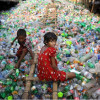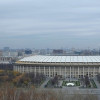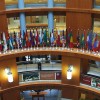In Russia, finding out who owns that Italianate villa or luxury apartment is currently possible thanks to the Unified State Register of Rights to Immovable Property, a government database managed by ROSREESTR, the Federal Service for State Registration, Cadastre, and Cartography. USRR data is in the public domain. It costs just 200-600 rubles (US$3.27-US$9.80) to […]

A bill to limit access to property registers in Russia will hide corruption

New milestone in fight against global corruption
On 25 September 2015, the world’s leaders assembled at the UN in New York and made a historic statement in approving 17 key objectives to focus actions across the globe to bring the core strengths of our civilisation to its real potential. The UN General Assembly adopted new global goals, the “Sustainable Development Goals (SDGs)” […]

Fighting corruption in Greece must be a priority
Greece now has a new government, its fourth in six years. One of the returning Prime Minister Alexis Tsipras’ priorities remains constant: to fight of corruption. Previous incarnations of this government had appointed a minister to strengthen this fight. This was definitely a good move but it did not deliver. The previous minister of state […]

Ending corruption, ending poverty – how will the SDGs measure up?
This week the United Nations will agree on 17 sustainable development goals. Goal 16 makes the case that fighting corruption is at the heart of delivering a better world. We have argued this case for many years and are beginning to amass the data to prove this. That’s why it is so important that in […]

Подготовке Чемпионата мира по футболу 2018 нужна прозрачность
В 2010 году Российской Федерации было присуждено право проведения Чемпионата мира по футболу 2018 года. После Зимних Олимпийских Игр 2014, Чемпионат мира станет вторым по величине спортивным событием в истории современной России. На проведение мероприятия правительство Российской Федерации утвердило бюджет в 660 млрд. рублей (16 млрд. долл. США). 335 млрд. рублей (8 млрд. долл. США) […]

Anti-Corruption Cards: Cambodia’s new craze
Transparency International Cambodia recently launched its Anti-Corruption Cards that offer shopping discounts to citizens who sign up to the Declaration Against Corruption. So far more than 8,000 people in the capital Phnom Penh and provinces have received their cards, entitling them to savings of up to 60 per cent at a variety of shops […]

FIFA reform: suggestions for fair and transparent finances
The resignation of Sepp Blatter as FIFA President on 2 June was swiftly followed by a commitment to immediate governance reform, led by independent chair of FIFA’s audit and compliance committee Domenico Scala. Central to Scala’s mandate will be a review of financial transparency, as well as the proportional representation of influence within FIFA. This […]

Advocating for FIFA reform – a sponsor´s perspective
There’s so much that’s good about sport. Next to family, I see sport and music as the two most important cultural influences on children. But the difference between the two is that the love of sport, the love of a team, the enjoyment to be derived from it can be shared between generations. It’s very […]

Ditching Integrity: US college sports in crisis
Before the American Civil War (1861-65), every state in the Confederacy had stringent laws forbidding anyone to teach slaves reading and writing. In North Carolina, it was a crime to distribute books or pamphlets to slaves. After emancipation, and well into the mid-20th century, schools remained segregated in both the North and South either by […]

Know your contractors: transparent ownership reduces corruption
Procurement is at the heart of the work that the World Bank and other international development banks do. Countries borrow from these multilateral organisations to develop the public works and services their citizens need: such as healthcare, education, sanitation and infrastructure. Through public procurement, countries use the borrowed funds to acquire expertise, labour and supplies […]
- State Capture in South Africa 14 February 2017
-
 What’s next for Ukraine?
16 December 2016
What’s next for Ukraine?
16 December 2016
-
 Cleaning up sport: conflicts of interest at the top
9 December 2016
Cleaning up sport: conflicts of interest at the top
9 December 2016
-
 OGP: France must do more to tackle corruption
9 December 2016
OGP: France must do more to tackle corruption
9 December 2016
-
 Pharma companies in Slovakia: Uncovering conflicts of interest
9 December 2016
Pharma companies in Slovakia: Uncovering conflicts of interest
9 December 2016
-
Nokubonga Ndima: Young people can make a change for a better future...
-
Benjamin M: Very good article! Congrats!...
-
arun kottur: In India sports minister was involved decades are ...
-
Ekonomi: Very beneficial article. Thank you very much. htt...
-
ksweeney1: I do not agree that https://apex.aero/2016/09/22/g...
Search
Categories
Latest news from Transparency International
No items, feed is empty.

 Connect with us on Facebook
Connect with us on Facebook Follow us on Twitter
Follow us on Twitter